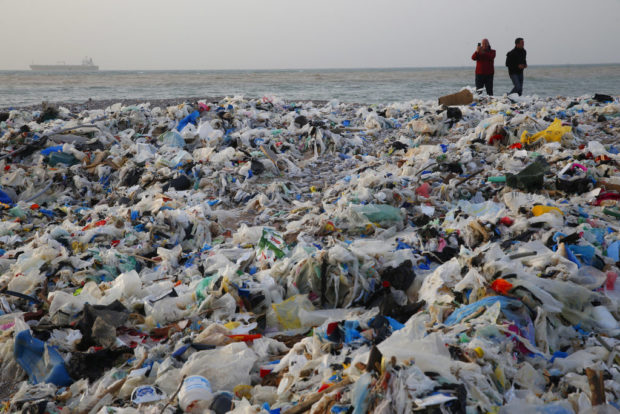Garbage on the beach: Flood of waste stirs uproar in Lebanon

In this Monday, Jan. 22, 2018, photo, a man takes photos of piles of garbage washed on shore after an extended storm battered the Mediterranean country at the Zouq Mosbeh costal town, north of Beirut, Lebanon. Environmentalists say a winter storm has pushed a wave of trash onto the Lebanese shore outside Beirut, stirring outrage over a waste management crisis that has choked the country since 2015. (AP Photo/Hussein Malla)
ZOUQ MOSBEH, Lebanon—Lebanon’s festering trash crisis came crashing ashore this week, after residents woke up to find a powerful winter storm had laid a mantle of waste at a beach just a few minutes’ drive north of the capital, Beirut.
The scenes were a national embarrassment for a country that once prided itself on its sparkling Mediterranean coastline but appears unable to wean itself off the convenience of throwing its trash into the sea.
“Somebody needs to pay for this,” said Paul Abi Rached, a local environmentalist who spearheaded a campaign to overhaul the government’s waste policies three years ago.
Few issues have driven a wedge between the Lebanese and their leaders like garbage — the most conspicuous of the government’s many failings to provide basic services to its constituents.
Lebanon has long been plagued by daily water and electricity outages, but it was not until the trash started going uncollected in Beirut that despair erupted into a wave of protests in 2015.
Article continues after this advertisementDemonstrators rallied under the banner “You Stink” — a reference not only to the stench accompanying the summer heat, but to the corruption and favoritism that has defined politics and paralyzed administrative services in the country.
Article continues after this advertisementCivil society groups say officials are making fortunes on shady deals for landfills and incinerators, at the public’s expense. They say, too, that the government is using trash to fill in land along the coast — a bonanza for politically connected developers who can cash in on the property that’s been raised, quite literally, from the sea.
A fleet of heavy machinery has been working the coastline east of Beirut since 2017, pouring trash into the Mediterranean at a land reclamation site at Dbayeh.
Officials say they are doing nothing untoward, and that the landfills they operate are done to technical specifications.
But the stench is impossible to deny.
Travelers arriving to Beirut’s Rafiq Hariri International Airport are greeted with a waft of odors from an expanding landfill at the end of one of the runways. Officials reopened the Costa Brava landfill there to absorb the trash left out in 2015.
In December, Prime Minister Saad Hariri ordered officials to close a waste-sorting plant in the city of Tripoli, built with $1.6 million from the European Union, just six months after it was inaugurated. Locals said the smells from the plant and the nearby fill were suffocating.
The scandal at Zouq Mosbeh beach led Lebanon’s nightly news broadcasts on Monday, but environmentalists say they were not surprised by the scene — a pile of cattle bones, footwear, tires and vast amounts of plastic waste that reached over 30 meters (100 feet) inland.
“The sea is regurgitating our trash,” said Joslin Kehdy, who heads Recycle Lebanon, an NGO that has organized a clean-up of Zouq Mosbeh beach each year since 2015. The country’s official waste management plan provides scant support to recycling initiatives.
Abi Rached said rough waves had broken down a faulty retaining wall around a coastal dump just east of Beirut, pouring trash into the sea.
The garbage saga is likely to spill into campaigns ahead of parliamentary elections in May. Lawmaker Sami Gemayel, who leads the country’s Kataeb party, said he would take the government to international court over the pollution.
Prime Minister Hariri said he ordered authorities to clean the Zouq Mosbeh beach immediately but those efforts may have to wait for another storm to pass — and bring even more waste ashore.
Meanwhile, Human Rights Watch launched a campaign last Friday against burning waste at over 150 open-air dumps around Lebanon.
The New York-based watchdog says the Lebanese government is in violation of international human rights law for failing to deal seriously with the pollution from burning waste. /jpv